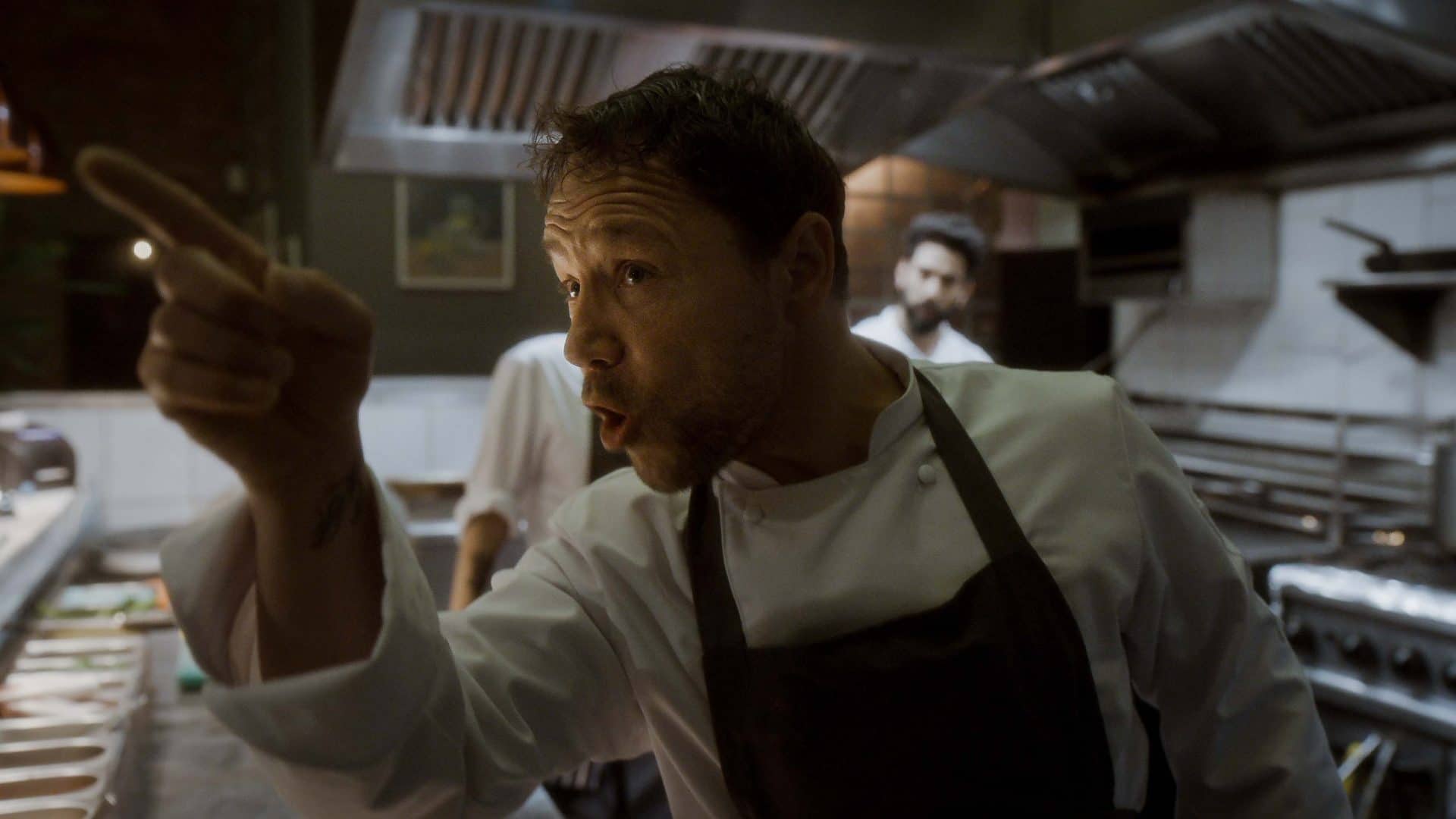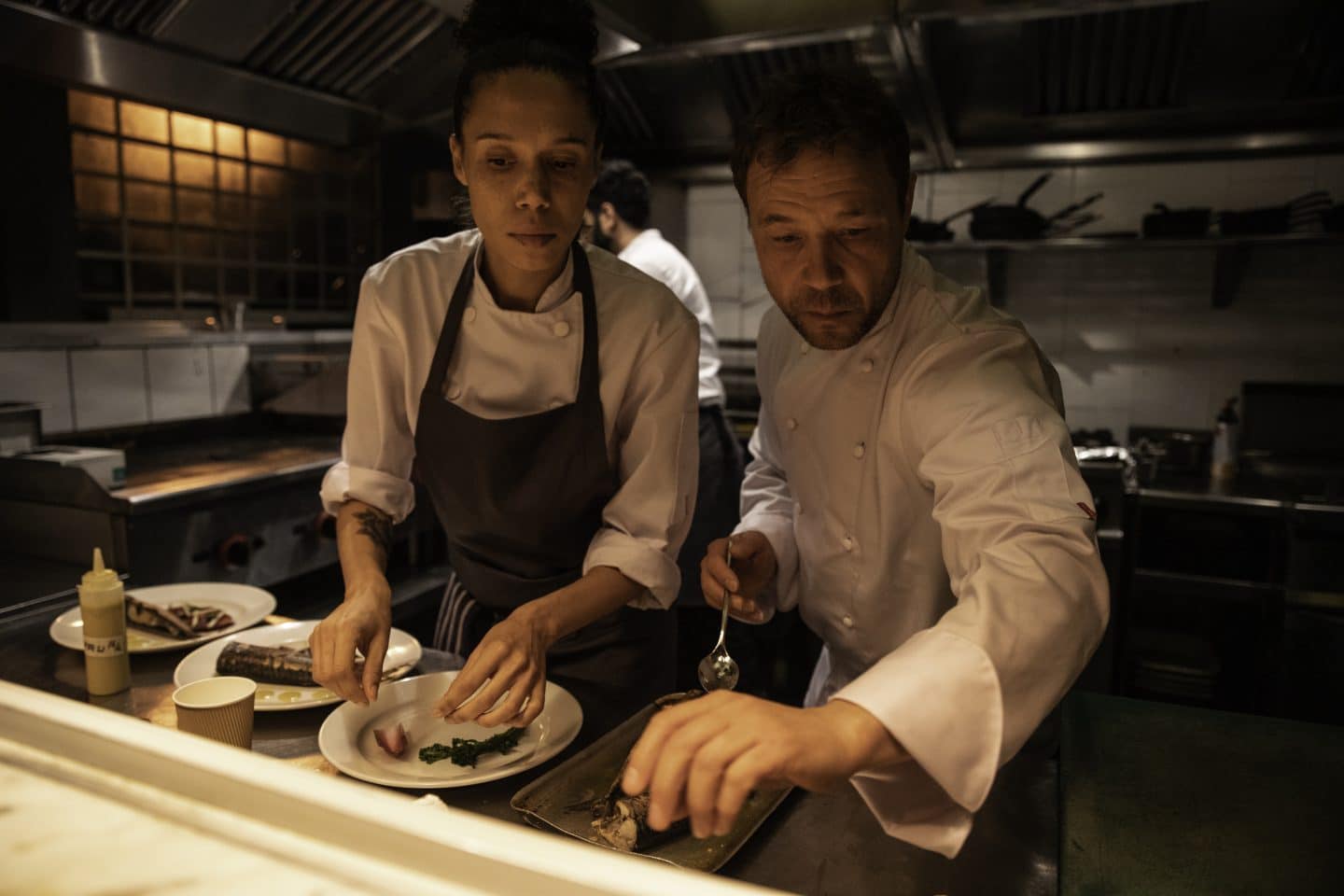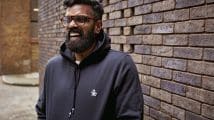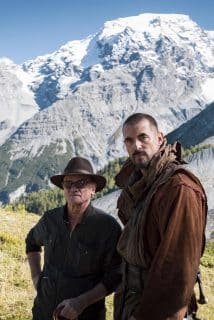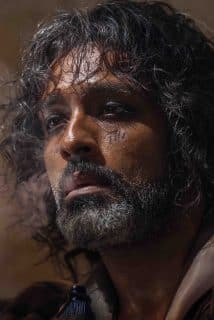The story behind Boiling Point
Culture
Boiling Point is a genius one-take film about the restaurant shift from hell. Here director Philip Barantini talks about the truth behind it.
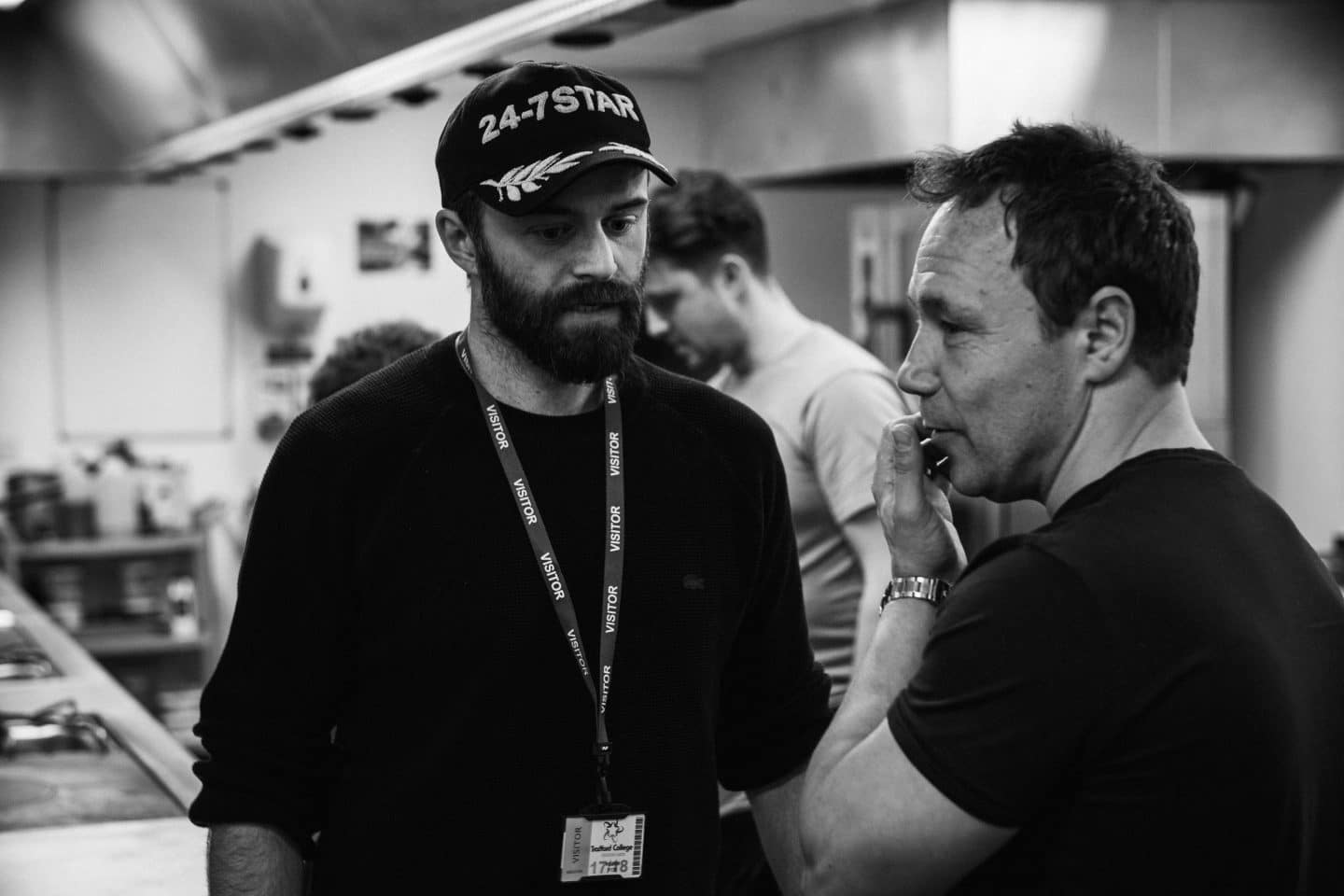
Boiling Point is a serious accomplishment, a film shot in real-time depicting a nightmare shift for head chef Andy Jones, played by Stephen Graham. Andy is someone hiding immense pressure, a crumbling home life and drink and drug problems, and the style of the film, with its breathless no-edits nervous energy perfectly echoes his on-a-knife-edge mental state. We spoke to the film’s director and co-writer Philip Barantini to find out more about the difficulties and delights of making such a unique film, and most importantly, heard about how Philip’s real-life struggles informed the story and led to its intense and unflinching portrayal of what happens when the mask of masculinity starts to slip…
Can you tell us about the origins of the film?
I was acting for 25 years plus, and towards the last 15 years, I needed to make some money with a second job. I was always passionate about food, so I started working in kitchens and worked my way up from the bottom to the top. By the end of it, I became a head chef, and started working for an agency and was sent around various different levels of places, from Michelin star to local cafes. So I’ve seen it all really and it’s kind of similar in every kitchen that you go in – that camaraderie, the family and then you’ve got all the stresses that come with it. When I started directing, I really wanted to set something in that world.
I wrote the short film with James Cummings, the co-writer, and we talked about different ways of shooting it. And then my cinematographer Matt Lewis came on board and he had a fantastic idea to do all in one take, which was 20 minutes for the short. I got Steven Graham on board and we were all systems go. The short was really well received, it did well in the festivals, and then it was a no brainer to write the feature.
How do you begin to approach a one-take film? Just the pure practicalities of it – was a lot of it about finding the right location?
Yeah, we wanted to do it purely in one take and not have any hidden cuts – there was quite a bit of pushback from some of the investors, saying, you can’t do it all in one take, you’re mad. And I was like, no, it’s been done before, with some great movies like ‘Victoria’. But yeah, before we even wrote the script, it was a case of finding the right location. Normally when you write a script you write locations that are in your head and then find somewhere that best suits to what you’ve written. But with this, it was a completely different way, we had to find the location first, and then map out the moves of where we wanted to go, and then a story and figure where we could place all the different characters. Myself, Matt, and James would go to the restaurant (Jones & Sons), even when it was open on busy days, and we just watched it. I had worked in the restaurant before, because it’s owned by one of my best mates, the real Andy Jones, who’s not like the character by the way. He would let us sit in, watch it, and then we would go into all the different spaces. Then it was a case of finding the right equipment, the right camera, to be able to do it all in one take. We were shooting it at 6k, which takes up a lot of data – the SD cards don’t last very long. So we found this one camera that you can live swap SD cards, while the camera is still going, which was when we knew we were going to be able to do it. We adapted the equipment, so that it best suited Matt to wear it, because it’s really heavy and he’s carrying it for almost two hours. He had the body of the camera on his back, and the lens at the front front.
But yeah, it took a lot of planning – it’s just like a dance really. You choreograph the moves, and it’s like a waltz. We had to do that meticulously and then we brought the actors in, just telling them their moves, and then where the camera was going to be. Trying to make everything fit together.
Script wise, were people improvising?
Yeah, absolutely. We wrote the script with extensive stage directions, and the story and the characters arcs were in there, but when it came to the dialogue, it was just bullet points. We workshopped it with the actors, which really brought it alive, and then we loosely wrote the dialogue that came from the workshops into the script.
I had to choose the right actors that could do that semi-improvised style. Everybody has their own process, but I needed actors that could do that. When you’re working with Stephen Graham, who is the master of improv, you’ve just got to be ready. I just said to them, ‘Don’t be tied down to that dialogue, as long as we’re moving forwards, the audience will never know what’s coming next.’
How many times did you shoot the whole film?
Originally, were meant to do it eight times over four days, twice per night, starting on Monday 16th of March 2020. We rehearsed for three weeks prior to that, building up to the 16th. We came in on the Monday, and we did it twice. In my mind and everybody else’s, we had six more turns at it. They were like dress rehearsals – we made two movies, but they weren’t perfect, they weren’t right. So that night, I was up till about three o’clock in the morning with Matt Lewis the cinematographer, talking about the film and planning ahead for the next day and what we needed to change. Then the producers called me and said tomorrow is going to have to be our last day, because we’ve had a few crew members who have pulled out because of this cloud of COVID that was coming over us; the news had said there was a lockdown imminent, and the government’s going to shut us down. The producers were getting really nervous, so they said tomorrow’s going to be our last day. I came in on the Tuesday and didn’t really tell everybody apart from Stephen and some key crew members. We did it twice. And it was the third take that we used in the end.
In that third one, was there any extra surprises that came into it that made it stand out for you?
Yeah, there were a couple of things. All of my work was pretty much done during rehearsals, because as soon as I called action on the take, I was in front of a monitor, watching it play out in real time. I didn’t want them to be put off by being behind the camera. There were a couple of things that I spotted that weren’t in the script, but it was absolutely fine because the audience don’t know the script, they don’t know what’s happening next. Steven said that one point, he spotted a bin that had been put in the wrong place, and Matt was walking backwards and would have literally fallen over backwards. Steven kicked the bin out of the way just in time and came back into his mark and started again, and that was on the tape we used.
It’s interesting as a viewer, knowing that it is all one take, there’s an extra tension when you’re watching it, like you’re holding your breath…
Well, that was the main intention, really. I didn’t want it to be like 1917 or Birdman, where it’s beautiful, and like every shot is a painting. I wanted it to be more of an anxiety-inducing feeling. And I think my experience is working in kitchens it that it’s like all one take. It all happens in this one night, and you’ve just got to be on this same train as everybody else. Because, if you fall off the train, the whole thing could be messed up. That’s what I kind of wanted to get across, a slice of life. Just throw the audience in, and then pull them back out again after an hour and a half in this moment in time.
It also lends that extra tension around Stephen Graham’s character, you really get that sense of someone who’s hiding enormous stress and it’s coming out in different ways. Was that important to you?
Yeah, 100% because I suffered my own problems. This Andy character is loosely based on my life and my experiences. I’ve been sober for almost seven years now, but during my time in kitchens, when I was drinking and doing all that, I was in a dark place. One of the main reasons why I wanted to make this film the way I did it was to shine a light on society so people can relate to it and see themselves in it, or notice these things in somebody else that they know, and say, ‘look, are you okay?’ The theme of the movie is everybody has two masks, right? The forward-facing mask can be happy and the nicest person in the world, but then everybody has the private mask when they go home at night, or in private moments. I wanted to show that, so somebody can watch it and know they’re not they’re not alone, that everybody is dealing with something at some point in their lives. And that there is help out there.
It’s quite hard within job environments too, when you have to get the job done despite everything going on.
Yeah, it’s an interesting one, and even with the racism in the movie I wanted to show that because there’s the forward-facing stuff with the obvious racists but then there’s people in whom it’s more passive. As a white man, I don’t see it on a daily basis, it’s not part of my life. I wanted to educate myself when we were looking into that moment in the movie [where a white guest makes disparaging remarks to a waitress], so when I cast Lauryn Ajufo, who plays the waitress, I just sat down with her for coffee, and we spoke for two or three hours – she just educated me on the little things that happen, that you wouldn’t necessarily think like, people saying, ‘Oh, I love your hair, can I have a touch?’ Things that you think, okay, I can really see why that would have an effect on you. It was important to get those moments across as best we could.
Just going back mental health – is that kind of intense working environment an addictive thing too, as much as the drink and the drugs? Does it all go together, especially when you’re doing these late nights in the restaurant world?
In my experience, yes, it did. You’ve got this close knit family that you’re working with, and in my experience, it wasn’t just me going off the rails, we all were at one point. Everybody’s having a little drink before work, and then you go down the path of people sneaking off and doing lines of coke. Then you start to rely on that, and it becomes this whole other thing where it’s just stressful, it’s not a nice feeling, you feel like you’re drowning. Two hours of a service, at the busiest time between 8 and 10 o’clock, can feel like a freight train coming at you. Those two hours can feel like a lifetime. Also the late nights. If you’re working on a double shift, they call it an AFD it stands for All Fucking Day. You are in from the morning and you don’t leave till 11 o’clock at night. You get maybe a little break in between but on your break, you go and have a drink to come down from the from the shift, and then you come back in and you’re a bit a bit intoxicated, and then you carry on. You finish work and you’re like, ‘oh, man, I need a drink, now it’s my time.’ You might have a lock in and the next minute, it’s five o’clock in the morning and you’re still at work. It’s a vicious cycle. It gets you in the end, it becomes a really dark place because you’re not really living a life, other than being in that in that world. You start relying on drinking, and everything else. You know, if it wasn’t for my wife, I don’t know where I’d be now, to be honest. She stood by me. I see now that there’s a lot of charities out there that can help people in hospitality with mental health issues and addictions, but when I was working, I don’t think there was anything there. And as a man, with the bravado, I didn’t want to reach out, I didn’t want people to think I’m stupid. But for me a real man is somebody who can show that emotion. A really strong man can say I need help, I’m struggling.
What was the key thing to get you out of that?
I stopped drinking, I went to see a therapist and stopped it all. For years, people had said to me, ‘maybe, knock it on the head, you need to calm down a bit.’ And I was like, ‘yeah, yeah, I will.’ But what I’ve since learned is until you want to do that, you’re never going to. You’re not gonna do it for anyone else, you’re only going to do for yourself, and until you really, really, really want to do it, you never will. That point came for me, I just couldn’t do it anymore. I went to see a therapist, and he just saved my life really. I’m very lucky that I was able to change that mindset the way I did, because I know a lot of people struggle.
Have you found yourself much more productive since then?
Yeah, it’s night and day. I’ll have been sober for seven years in March. You’ve got a whole different mindset. Don’t get me wrong, there’s moments, special occasions like Christmas, when you wish you could join in a bit more and be on that level, but then I look at where I was, and know I never want to be that again.
My mum passed away five years ago, quite suddenly. And everyone in my family and my friends thought I was gonna go off the rails. But it was the complete opposites in my mind, I was like, ‘No, I want to make her proud.’ I can feel her presence around me all the time, you know, and that has been a big part of me getting up in the morning and pushing me forward. The mindset I’ve got now is why I’m doing what I love. I’d never had the confidence to direct for many years, I never thought I could do it because I’m just some kid from Liverpool and directors are educated people who went to film school. But when that happened to my mum, I was like, what’s the worst that can happen? Give it a go. Ever since, it’s been an amazing journey. It has definitely has changed my life.
How has it been since it’s the film was released? It’s been brilliantly received.
It’s mad. When I came up with the idea, because it is a personal story you think, are people going to give a shit? Probably not. Is it a bit of a vanity thing, or are people going to relate to it? You have all these anxieties and worries, but when it was released it’s absolutely blown my mind and I’m just bowled over by the love it’s getting.
Just finally, what else have you got coming up this year?
I’m doing a movie which we start prepping on the 24th of January. I can’t really say anything about it just now, but it’s a thriller. That’s really exciting. And then I’ve got I’ve been sent lots of scripts and I’ve been writing stuff with James Cummings. I’m super excited for that for the future. I can’t wait to continue it. It’s the best job in the world. I’m waking up every morning doing what to do and it’s a dream, honestly. You have to do what you love because you’re only gonna get one life and you have to make the most of it. It’s difficult to do that at times, so I feel grateful for in the position that I’m in now, compared to where I was. Hopefully if I can help one person who’s struggling, with this movie or any movies that I’m doing, then that’s my job done.
Boiling Point is on streaming sites now and will soon be a major TV show.
Follow Philip on Instagram:

Join The Book of Man
Sign up to our daily newsletters to join the frontline of the revolution in masculinity.




